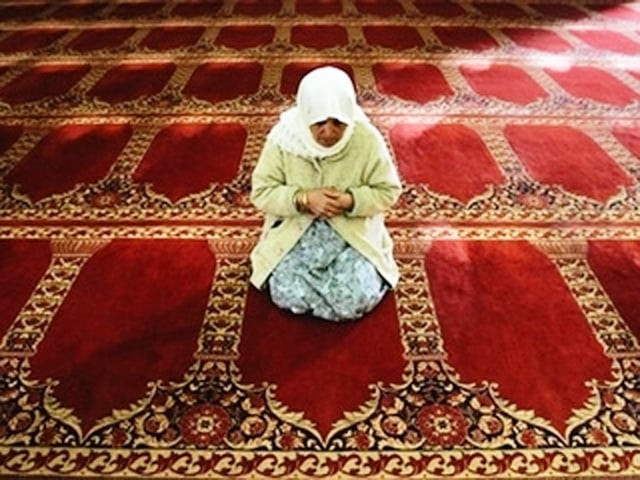“But you are not allowed here.”
He took us to a dark, dingy warehouse on the far right. “Pray here,” he said. I looked around. It was a deserted room with unwashed utensils and dirty clothes scattered everywhere.
Not allowed? I kept thinking to myself. Why on earth am I not allowed to come to the house of my Lord? I was enraged but my friend put a hand on my shoulder as if to tell me:
“It’s okay. Live with it. You can’t change the system.”
However, for me, this was the worst form of sexual apartheid I had ever experienced and that too in a country which the maulanas and muftis are never tired of calling an ‘Islamic’ state. I am a Muslim woman and I am treated in a way that the holy prophet Muhammad (pbuh) would have never approved of.
Why?
Because, no matter what the maulanas say and what the feminists scream, one thing is as clear as daylight – ours is a venomously male-dominated society. If you disagree, go to any masjid in the country.
Corruption is not just a defining factor of our politics and economics; it has more dangerously devoured our masjids. The Islam that we see around us today is not the religion that was preached by the blessed messenger of Allah (pbuh). It has been changed and abrogated to suit male needs and to satisfy their egoistic wants.
The worst place, to change religion is a masjid.
While women are allowed to attend weddings, study in co-ed institutes, go to parties and visit the busiest marketplaces, isn’t it strange that they are not allowed masajid.
Why these double-standards? Why this disparity?
Most (almost all) of the Islamic jamaats here in Paksitan deprive Muslim women of one of their fundamental rights - the access to true religious education. Women are shooed away from the masajid as if they are untouchables and the men, Brahmins.
In the recent past, I wanted to learn more about Islam. In my quest, I went to hear various Islamic jamaats (especially those which are considered ‘liberal’ and not ‘extremist’) to hear what they had to say and to learn the truth about Islam. I was disappointed that I had to leave them because they were extreme in their own ways.
They segregate and suffocate women, put them in claustrophobic religious domains and treat them as if they belong to an entirely different world.
The prohet (pbuh) allowed women to pray in mosques
Many men are going to find it very hard to digest but Prophet Muhammad (pbuh) warned his followers:
“Do not prevent women from coming to the Masjid (for prayer)”.
(Sahih Muslim Vol.1 Chapter 177 Hadith No.886)
He even went to the extent of saying:
“When the women ask you to go to the mosque at night, allow them.” (Sahih Bukhari Vol.1: Hadith # 824: Ch # 80)
Now we know as Muslims that if an order comes from Allah and his prophet (pbuh), we have no right to abrogate, cancel or disobey it. We can suspend it for a time being due to some abnormal circumstances (such as a suspension of the divine law of cutting of the hand of the thief as a consequence of an abnormal situation created by drought and famine) but it cannot be a permanent ban.
Yet, despite the clear warning from the holy prophet (pbuh), it is a very common sight today the world over and especially in Pakistan, that women are excluded from the masajid.
Such a flagrant violation of female rights has provoked bitter responses from women. For example, in New York, a female stood up to lead the congregational prayer. What are our men going to do when women have masajid for ‘women only’ and when they reach the pulpit to deliver the Friday sermon? We will have to pay a bitter price for denying women their rights.
No barriers, no separate rooms
The violation of women rights is not limited to their prohibition from entering into the masajid. Even if they are allowed in, an entirely separate place is allocated to them. This can be a basement, an annex, an upstairs corridor etcetera. If they are allowed to pray in the same hall, a huge barrier is placed between them and the men. This may be made of cloth, wood or even brick, thus making a completely separate place of prayer for men and women. The women can neither see the imam leading the prayer nor the jamaat praying. Thus, the women pray with their ears alone and not with both eyes and ears as it used to be (and most of us don’t know it) at the time of the Holy Prophet (pbuh).
Prophet Muhammad (pbuh) had the women and men pray in the same space, with the men at the front and the women at the back. Consider this Hadith:
“The best row for men is the first row and worst is the last, and the best row for women is the last row and worst is the first.” (Indicating that men and women pray together in the mosque)
(Sahih Muslim Vol.1: Hadith # 881: Ch # 175)
This hadith is very clear and shows us that in the Prophet’s (pbuh) time, men used to start filling the rows from the front and the women did so from the back. Logic tells us that the last row of the males and the first row of the females might have the greatest proximity and it is in such circumstances that the sparks might fly. But this further strengthens the point that there was no barrier between the men and the women at that time. If there was, there could be no possibility of physical proximity and thus there was no need to mention the phenomenon of the first and last rows.
If a woman wishes to pray at her home, it is a matter of preference but that would not solve the problem for those women who wish to perform their prayers in the masjid and are denied the above-mentioned rights.
The remedy for this situation is that Muslims (men and women) insist that women be allowed to pray in the mosque, in the same space and without a barrier so that they can pray with both their eyes and their ears and that their vision of the congregation is not obstructed. Nothing less than that is going to save the Muslims from the charge of having changed their religion and nothing less than that can save them from the evil storm of feminism that is sure to exploit the Muslim ummah in the not-so-distant future and reap evil capital by doing so.
Disclaimer: This feature may generate provocative responses not only from the male members of our society but also from the females. However, I want to make it clear that this piece of writing is not written for creating dissension or to generate fitnah. The purpose of it is to generate an intelligent discussion from enlightened readers in order to break the complacency prevailing in matters of Islamic traditions.



COMMENTS
Comments are moderated and generally will be posted if they are on-topic and not abusive.
For more information, please see our Comments FAQ